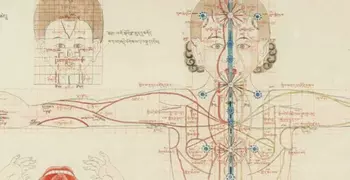Using an Integrated Approach for Anxiety and Depression

The relatively new field of integrative mental health is a holistic model that provides a useful perspective on brain health and the treatment of depression and anxiety.
Integrative mental health looks at the physical, psychological, social, and spiritual health of the individual and incorporates:
- Health-promoting lifestyle changes
- Evidence-based integrative therapies and healing practices
- Mainstream treatments, including psychosocial therapies and the judicious use of prescription medication
Optimizing brain health
While depression and anxiety are usually categorized as mental illnesses, we find it more useful to think of them as disruptions in brain health, which is directly related to the physical makeup and mechanisms of the brain, as well as emotional and relational issues.
You can change your brain
Instead of being a static organ that doesn’t change after adolescence, the brain is now seen as having a lifelong dynamic ability to change in response to its environment.
Neuroplasticity is the term used to explain the brain’s ability to change (from small cellular changes to complete remapping) in response to new learning, experience, or injury. This new understanding underlines the importance of paying attention to our brain health and development.
Working with your provider team
 When suffering from moderate to severe symptoms of depression or anxiety, it is critical to have a working relationship with a provider, or team of providers, who can help you choose a treatment approach for your type of depression or anxiety and evaluate its effectiveness. An integrative approach includes psychosocial therapies and the judicious use of medication, as well as evidence-based complementary therapies and health-promoting lifestyle changes. The providers may include a primary care physician, nurse practitioner, psychotherapist, or other professional who is philosophically aligned with you, as well as integrative therapy providers.
When suffering from moderate to severe symptoms of depression or anxiety, it is critical to have a working relationship with a provider, or team of providers, who can help you choose a treatment approach for your type of depression or anxiety and evaluate its effectiveness. An integrative approach includes psychosocial therapies and the judicious use of medication, as well as evidence-based complementary therapies and health-promoting lifestyle changes. The providers may include a primary care physician, nurse practitioner, psychotherapist, or other professional who is philosophically aligned with you, as well as integrative therapy providers.
If you are taking any oral natural supplements in combination with conventional prescription medications, it is critical for both the prescriber and the pharmacist to be know which supplements you are taking.
Risk for suicide
The risk for suicide often increases after early improvement induced by either medications or supplements, as the individual finds more energy and a sense of self-control. Support during this time of treatment is critical.
If there are any thoughts of or plans for suicide, a therapist, psychiatrist, or physician must be involved immediately, even if that necessitates the use of emergency medicine services. If someone doesn’t willingly request help, family or other supportive members of that person’s social sphere may need to intervene and engage services.
Disclaimer: The information in this website page is not to be used in place of medical treatment by a health or mental health provider.
Bent, S., Padula, A., Moore, D., et al. (2006). Valerian for sleep: a systematic review and meta-analysis. American Journal of Medicine;119, 1005-12.
Bystritsky, A., Hovav, S., Sherbourne, C., Stein, M.B., Rose, R.D., Campbell-Sills, L., et al. (2012). Use of complementary and alternative medicine in a large sample of anxiety patients. Psychosomatics; 53(3), 266-72.
Chan, M.F., Wong, Z.Y., Thayala, N.V. (2011). The effectiveness of music listening in reducing depressive symptoms in adults: A systematic review. Complementary Therapies in Medicine; 19(6), 332-48.
Cramer, H., Lauche, R., Langhorst, J., Dobos, G. (2013). Yoga for depression: a systematic review and meta-analysis. Depression and Anxiety; 30(11), 1068-83.
Derom, M.L., Sayón-Orea, C., Martínez-Ortega, J.M., Martínez-González, M.A. (2013). Magnesium and depression: A systematic review. Nutritional Neuroscience; 16(5), 191-206.
Goyal, M., Singh, S., Sibinga, E.M., Gould, N.F., Rowland-Seymour, A., Sharma, R. (2014). Meditation programs for psychological stress and well-being: A systematic review and meta-analysis. JAMA Internal Medicine; 174(3):357-68.
Jorm, A.F., Morgan, A.J., Hetrick, S.E. (2008). Relaxation for depression. Cochrane Database of Systematic Reviews; 8(4), CD007142.
Larzelere, M.M., Campbell, J.S., Robertson, M. (2010). Complementary and alternative medicine usage for behavioral health indications. Primary Care; 37(2), 213-36.
Mind Organization. (2007). Ecotherapy: The green agenda for mental health. UK: Mind Publications.
Morgan, A.J., Jorm, A.F. (2008). Self-help interventions for depressive disorders and depressive symptoms: A systematic review. Annals of General Psychiatry; 7, 13.
Pakseresht, S., Boostani, H., Sayyah, M. (2011). Extract of valerian root (Valeriana officinalis L.) vs. placebo in treatment of obsessive-compulsive disorder: a randomized double-blind study. Journal of Complementary & Integrative Medicine; 8. doi: 10.2202/1553-3840.1465.
Payne, P., Crane-Godreau, M.A. (2013). Meditative movement for depression and anxiety. Frontiers in Psychiatry; 4:71.
S-Adenosyl-L-Methionine (SAMe): An introduction. (2013). National Center for Complementary and Integrative Health (NCCIH). Retrieved April 3, 2014 from https://nccih.nih.gov/health/supplements/SAMe.
Saeed, S.A., Bloch, R.M., Antonacci, D.J. (2007). Herbal and dietary supplements for treatment of anxiety disorders. American Family Physician; 76(4), 549-56
Shih, M., Yang, Y.H., Koo, M. (2009). A meta-analysis of hypnosis in the treatment of depressive symptoms: a brief communication. The International Journal of Clinical and Experimental Hypnosis; 57(4), 431-42.
Smith, C.A., Hay, P.P.J., MacPherson, H. (2010). Acupuncture for depression. Cochrane Database of Systematic Reviews; 1. DOI: 10.1002/14651858.
Stub, T., Alrek, T., Liu, J. (2011). Acupuncture treatment for depression--A systematic review and meta-analysis. European Journal of Integrative Medicine; 3(4), e259-e270.
Wang, C.W., Chan, C.H., Ho, R.T., Chan, J.S., Ng, S.M., Chan, C.L. (2014). Managing stress and anxiety through qigong exercise in healthy adults: a systematic review and meta-analysis of randomized controlled trials. BMC Complementary and Alternative Medicine; 14:8.
Wang, F., Man, J.K., Lee, E.K., Wu, T., Benson, H., Fricchione, G.L., et al. (2013). The effects of qigong on anxiety, depression, and psychological well-being: a systematic review and meta-analysis. Evidence Based Complementary and Alternative Medicine; 2013: 152738.
Wu, P., Fuller, C., Liu, X., Lee, H.C., Fan, B., Hoven, C.W., et al. (2007). Use of complementary and alternative medicine among women with depression: results of a national survey. Psychiatric Services; 58(3), 349-56.
Zhang, Z.J., Chen, H.Y., Yip, K.C., Ng, R., Wong, V.T. (2010). The effectiveness and safety of acupuncture therapy in depressive disorders: systematic review and meta-analysis. Journal of Affective Disorders; 124(1-2), 9-21.
 What we
What we 

